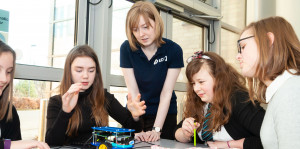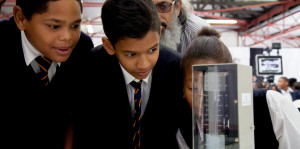Robotic surgery and drones delivering donor organs may sound like the stuff of science fiction, but they’re now science fact, as technology increasingly pushes the boundaries of possibility to improve healthcare.
Leaps in artificial intelligence (AI) and the collection of data used to power it mean it could also be possible to save lives by speeding up diagnoses of diseases like cancer.
This is according to the UK government, which is on a mission to use data, AI and innovation to “transform the prevention, early diagnosis and treatment of chronic diseases by 2030”, resulting in 20,000 fewer deaths within five years of diagnosis than there are today.
Here are five ways AI and data are helping to transform healthcare…
1. Chatbots
Half the world’s population is unable to afford basic healthcare, according to the World Bank and World Health Organization. But companies like Babylon are using AI to make healthcare more accessible and affordable. It says its AI-powered chatbot interface is designed around a doctor’s brain, and can interpret your symptoms, provide information and connect you to the most appropriate service.
2. Analyzing health data
Electronic health records (EHRs) can hold huge amounts of data about our health, including our DNA and RNA. Companies like molecular diagnostics specialist QIAGEN help labs analyze samples of DNA and RNA for healthcare and life sciences research, making the results easy to interpret. Analysis of this data can help with early diagnosis and prevention of diseases in individuals, as well as the exploration of diseases.
3. Social robots
Although some fear job losses due to automation, the rise of robots is not necessarily a bad thing. In America and Europe, one robot in particular is making a real difference to the health of children and the elderly. The Zora social robot has not only inspired residents of a nursing home to stay active, but it has also helped children recover from physical injuries by encouraging them to exercise again.
4. Wearable fitness technology
A Tata Consultancy Services (TCS) survey in 2017 found more than a third (37%) of British people use some form of fitness, health or wellness technology, while almost 10% said fitness tech had had the single most positive impact on their health over the past 12 months. The tech is becoming more wearable and able to offer us even more health data, such as these contact lenses that can monitor blood sugar levels.
5. Transforming drug delivery
The way that medicines are tested and delivered is changing thanks to digital technology. TCS is patenting a new computer model to do just that. It effectively creates a ‘digital skin’ to simulate less invasive ways drugs could be delivered – which also eliminates the need for animal testing and would speed up the time it takes to get medicines to market.

